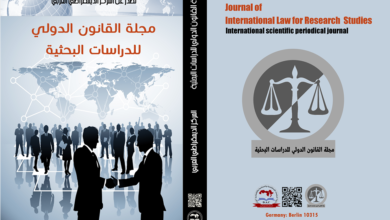الانسحاب الأحادي الطرف من المعاهدات الدولية الجماعية (الاتفاق النووي الإيراني لعام 2015 نموذجاً)
Unilateral withdrawal from Multilateral international treaties (Iranian nuclear Deal 2015 as a model)

تأليف : علي احمد سهو
نسخة “pdf”-
الانسحاب الأحادي الطرف من المعاهدات الدولية الجماعية (الاتفاق النووي الإيراني لعام 2015 نموذجاً)
الطبعة الأولى “2022″ –من كتاب: –
الانسحاب الأحادي الطرف من المعاهدات الدولية الجماعية (الاتفاق النووي الإيراني لعام 2015 نموذجاً)
جميع حقوق الطبع محفوظة #المركز_الديمقراطي_العربي ولا يسمح بإعادة إصدار هذا الكتاب أو اي جزء منه أو تخزينه في نطاق إستعادة المعلومات أو نقله بأي شكل من الأشكال، دون إذن مسبق خطي من الناشر .
تقديم:
تتمتع المعاهدات الدولية بالحجية القانونية، التي يحرم المساس بها، وتأتي المعاهدات الدولية في المرتبة الأولى في قاعدة الهرم القانوني من حيث الالزامية، إذ تعد المعاهدات الدولية المصدر الرسمي الأول من مصادر القانون الدولي وفقا لنص المادة 38 من النظام الأساسي لمحكمة العدل الدولية، وباعتبار أن الدولة صادقت أو وافقت أو قبلت الالتزام بالمعاهدة بملء إرادتها، فإن هذا التصرف يلزمها احترام حجية المعاهدة التي قبلت التزام بها، لكن هذا لا يعني تأبيد الالتزام، وعدم السماح للدولة بالتحلل منه، وعلى الرغم من ذلك فإن ممارسة الدولة هذا الحق يخضع لضوابط وشروط قانونية حددتها اتفاقية فيينا لقانون المعاهدات الدولية لعام 1969، باعتباره القانون الناظم لعقد المعاهدات الدولية في العصر الحالي.
يعد الاتفاق النووي الإيراني لعام 2015 أو بما يطلق عليه بـ(خطة العمل الشاملة المشتركة)، المعقود بين كل من جمهورية إيران الإسلامية ومجموعة 5+1، نموذجا للمعاهدات الدولية الجماعية، والذي سرعان ما طرأت عليه المتغيرات المتمثلة في الانسحاب الأحادي الطرف منه من قبل الولايات المتحدة في منتصف العام 2018.
بناء عليه تعالج هذه الدراسة مدى مشروعية الانسحاب بالإرادة المنفردة من المعاهدات الدولية الجماعية وفقا لأحكام قانون المعاهدات الدولية لعام 1969، وتطبيق هذه الأحكام العامة على الانسحاب الأميركي المنفرد من الاتفاق النووي الإيراني لعام 2015 كنموذج للمعاهدات الدولية الجماعية، إضافة إلى انعكاس هذا التصرف على السلم والاستقرار العالمي.
تناول الفصل الأول من الدراسة القراءة القانونية للانسحاب بالإرادة المنفردة من المعاهدات الدولية الجماعية، والذي يخضع لأربعة قواعد قانونية تتمثل في: (العقد شريعة المتعاقدين- رضا الأطراف المتعاقدة- الإخلال الجوهري بنصوص الاتفاق- التغير الجوهري في الظروف)، ومن ثم تطبيق هذه القواعد على الانسحاب الأميركي المنفرد من الاتفاق النووي الإيراني لعام 2015.
تناول الفصل الثاني من الدراسة الانعكاسات القانونية للانسحاب المنفرد من المعاهدات الدولية الجماعية، سيما الانسحاب الأميركي المنفرد من الاتفاق النووي الإيراني لعام 2015، بداية لجهة النتائج القانونية لتطبيق القوانين الأميركية خارج الحدود، كالعقوبات الأميركية المنفرد المفروضة على إيران، وبالتالي دراسة مدى توافق هذه العقوبات مع أحكام القانون الدولي العامة والخاصة بحقوق الإنسان، فضلا عن دراسة الالتفاف القانوني الوطني والدولي على العقوبات الأميركية المنفردة، التي طالت معها الشركات الأجنبية المستثمرة في إيران، وما ولدته هذه التصرفات من انعكاسات مباشرة على السلم والاستقرار العالمي، إضافة إلى دراسة الوضع القانوني للطبيعة المزدوجة للطاقة النووية، والتي تتمثل في الاستخدام السلمي للطاقة النووية، و واجب منع انشار السلاح النووي، في ظل الانسحاب الأميركي المنفرد من الاتفاق النووي الإيراني لعام 2015، سيما وأن هذا الاتفاق هو الاتفاق الناظم لمسألة الاستخدام الإيراني للطاقة النووية، وما خلفه التصرف الأميركي من انعكاسات على السلم والاستقرار العالمي.
Ali Ahmad Sahou
Abstract
International treaties have the legal authenticity, which is forbidden to prejudice, and international treaties come first in the legal pyramid base in terms of mandatory, as international treaties are the first official source of international law sources in accordance with the text of Article 38 of the Basic System of the International Court of Justice, and given that the state is She approved, agreed or accepted the commitment to the treaty to fill its will, this behavior requires respect for the authenticity of the treaty that has accepted a commitment to it, but this does not mean perpetuating the commitment, and not allowing the state to decompose it, and despite this, the exercise of the state this right is subject to legal controls and conditions specified by the agreement Vienna for the 1969 International Treaties Law, as the law regulating international treaties in the current era.
The Iranian nuclear agreement for the year 2015, or what it is called (the joint comprehensive action plan), is held between the Islamic Republic of Iran and the 5+1 group, is a model of collective international treaties, which has been the speed of the variables of unilateral withdrawal from the states by the states United in mid -year 2018.
Accordingly, this study addresses the extent of the legitimacy of withdrawing with the individual will of collective international treaties in accordance with the provisions of the International Treaties Law of 1969, and the application of these general provisions to the unilateral American withdrawal from the Iranian nuclear agreement for the year 2015 as a model for collective international treaties, in addition to the reflection of this behavior on global peace and stability.
The first chapter of the study dealt with legal reading to withdraw with the individual will of collective international treaties, which is subject to four legal rules represented in: (the contract is the law of contractors- the consent of the contracting parties- the fundamental breach of the texts of the agreement- the fundamental change in circumstances), and then the application of these rules to withdraw The individual American of the 2015 Iranian nuclear agreement.
The second chapter of the study dealt with the legal repercussions of the individual withdrawal of collective international treaties, especially the unilateral American withdrawal from the Iranian nuclear agreement for the year 2015, the beginning of the legal results of the application of American laws outside the borders, such as the unilateral US sanctions imposed on Iran,Consequently, studying the extent to which these sanctions are compatible with the provisions of international and human rights law, as well as the study of national and international legal circumvention on the individual US sanctions, with which foreign companies invested in Iran have affected, and the direct repercussions generated by these actions on global peace and stability, in addition to Study the legal status of the dual nuclear energy, which is the peaceful use of nuclear energy, and the duty to prevent the nuclear weapon spreading, in light of the individual American withdrawal from the Iranian nuclear agreement for the year 2015, especially since this agreement is the organizing agreement of the issue of Iranian nuclear energy, and what is behind it American behavior of repercussions on global peace and stability.
- الناشر: المركز الديمقراطي العربي للدراسات الإستراتيجية والسياسية والاقتصادية





